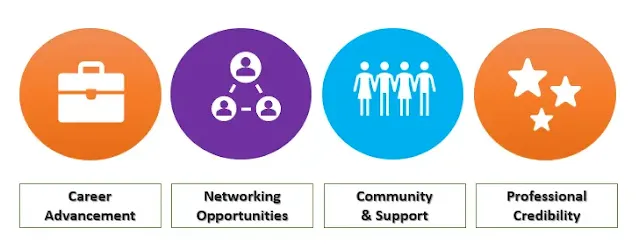Estimated Reading Time: 5 minutes
How to Choose the Right Online Course for Your Career?
Whether you’re looking to advance in your current role, switch careers, or acquire new skills, the right online course can make a significant impact on your career trajectory. But with countless options available, how can you choose the best online course for your career goals?
In this guide, we’ll explore practical steps to help you make an informed decision, as well as tips on identifying the most relevant online courses that align with your career aspirations.
1. Identify Your Career Goals and Learning Objectives
Before you dive into the vast world of online courses, it’s crucial to define what you want to achieve. Ask yourself the following questions:
- Are you looking to enhance your current skill set, or are you aiming for a career change?
- Do you need technical expertise, soft skills, or both?
- Are you preparing for a specific certification or exam?
Career-oriented learning objectives should always drive your decision. For instance, if you're aiming for a career change into data science, an in-depth course in machine learning or data analytics will be more useful than a general management course.
Tip: Be specific when setting goals. For example, instead of saying "I want to learn marketing," set a goal like, "I want to master digital marketing and SEO to increase my job opportunities."
2. Research Course Providers and Reviews
Once you have a clear idea of what you're looking for, start researching credible course providers. Some of the most popular platforms include:
- Coursera (Best for university-led programs)
- Udemy (Wide variety of affordable courses)
- LinkedIn Learning (Great for career-specific skills)
- edX (University-level learning opportunities)
Check reviews and ratings from previous learners to assess the quality of the course. You can often find valuable feedback that highlights the course’s strengths and weaknesses, the instructor's teaching style, and how the course contributed to others’ career progression.
Tip: Look for user testimonials or professional endorsements of the course. These can give you insights into how the course has helped real professionals in your field.
3. Consider the Course Content and Structure
The curriculum and course content are the backbone of any online learning experience. When reviewing courses, pay attention to the following:
- Is the content up-to-date and relevant? The world of technology, business, and marketing evolves quickly. Ensure the course offers the most current information.
- Does the course offer hands-on experience? Courses with real-world projects or practical exercises can provide better retention and understanding.
- Is there a clear structure? Look for a course that is divided into manageable modules, with clear objectives and learning outcomes.
If you're pursuing a career in a field like data analysis, you might want a course that includes practical coding exercises, quizzes, and a final project. If you're focusing on something like leadership skills, you might prioritize case studies and theory-based content.
4. Assess the Credentials of the Instructor
The qualifications and experience of the instructor can greatly influence the quality of the course. Look for instructors who:
- Have real-world experience in the field.
- Are recognized experts or industry leaders.
- Provide interactive learning materials (videos, case studies, discussion forums).
Tip: Explore instructors’ profiles on platforms like LinkedIn. You can gauge their professional experience and reputation in the industry, which may indicate the level of expertise they bring to the course.
5. Evaluate Flexibility and Time Commitment
A major benefit of online learning is flexibility, but this can vary significantly across different platforms and courses. Some courses allow you to learn at your own pace, while others may have set deadlines or require scheduled participation in live sessions. Consider:
- How much time do you have available? If you are working full-time, you may need a self-paced course.
- Are you looking for short-term or long-term learning? Some career-focused courses are intensive and designed to be completed quickly, while others may span several months.
Look for short-term certificate programs if you need to quickly enhance your resume. However, if you're looking to make a career shift, you might want a more comprehensive program that spans several months.
6. Consider Cost vs. Return on Investment (ROI)
While many online courses are relatively affordable, it’s essential to consider the potential return on investment (ROI) the course offers. Ask yourself:
- Does the course provide skills that are in demand in the job market?
- Will completing the course increase your earning potential?
- Does the course offer certifications or credentials recognized by employers in your industry?
For example, a project management certification from a well-known provider like PMP could significantly increase your chances of landing a higher-paying job in the field of project management.
7. Look for Networking Opportunities and Community Support
A course with a vibrant online community can provide added value. Whether through discussion boards, group projects, or live webinars, interacting with other students can enhance your learning experience. Networking opportunities can also help you connect with professionals and build relationships that could benefit your career.
Check if the course offers:
- Mentorship programs
- Peer review opportunities
- Private community forums where you can ask questions and share insights
Tip: Networking is especially important in fields like business management or marketing, where collaboration and connections can help you land new opportunities.
8. Check for Accreditation and Certification
For some career paths, having an accredited certification is a must. Accreditation ensures that the course meets certain academic or professional standards, which can make it more attractive to employers. Additionally, having a certificate or a digital badge can be a valuable addition to your resume and LinkedIn profile.
Tip: If you’re pursuing a career in highly regulated industries like healthcare or finance, accreditation may be a key factor in your decision.
9. Stay Updated on Emerging Trends
As industries evolve, so do the skills required to stay competitive. Stay updated on emerging trends in your field by regularly exploring new online courses and certifications. Many platforms now offer specialized courses on cutting-edge topics such as:
- Artificial Intelligence (AI) and Machine Learning
- Data Analytics and Big Data
- Cloud Computing
- Blockchain Technology
Incorporating such future-focused learning into your career development plan can give you a competitive edge in a rapidly changing job market.
Take the First Step Toward Career Growth
Choosing the right online course for your career can be a transformative experience. By understanding your career goals, researching course content, assessing instructors’ credibility, and considering the flexibility of learning, you can make an informed decision that aligns with your aspirations. Keep in mind that online learning is not just about gaining new knowledge, but also about positioning yourself for success in your chosen field.
Whether you are pursuing a data science bootcamp to transition into tech or enhancing your leadership skills for a promotion, the right course will help you reach your goals. Remember, professional growth is a journey—online courses are a powerful tool to help you take the next step in your career.
FAQs
1. How do I know if an online course is right for my career?
Answer: Start by clearly defining your career goals. Whether you're seeking to enhance your current skills, switch careers, or gain specific certifications, ensure the course aligns with your objectives. Research the course content to make sure it covers relevant skills in demand in your industry, and look for hands-on experience, up-to-date materials, and instructor expertise.
2. What factors should I consider when choosing an online course?
Answer: Key factors include:
- Course content and structure: Ensure the curriculum is relevant, practical, and current.
- Instructor credentials: Look for experienced and recognized instructors in the field.
- Time commitment and flexibility: Choose a course that fits your schedule and learning pace.
- Cost vs. return on investment (ROI): Evaluate the potential benefits, such as increased job opportunities or salary potential, versus the course cost.
- Accreditation and certification: Check if the course offers recognized credentials that will enhance your resume.
3. Are there any free online courses that can help advance my career?
Answer: Yes, many platforms like Coursera, edX, and LinkedIn Learning offer free courses, though some may charge for certification. While free courses can be a good way to learn new skills, paid courses often provide more comprehensive materials, mentorship, and certification that are more valuable for career advancement.
4. How do I assess the quality of an online course?
Answer: Research reviews, ratings, and testimonials from previous learners. Look for feedback on the course content, the instructor’s teaching style, and how the course contributed to participants' career growth. Additionally, check if the course provider is reputable and if the instructor has real-world experience in the subject matter.
Reference Source:
https://www.linkedin.com/pulse/how-choose-right-online-course-your-career-goals-sjhkc


.webp)

.webp)

%20(1).webp)

.webp)
